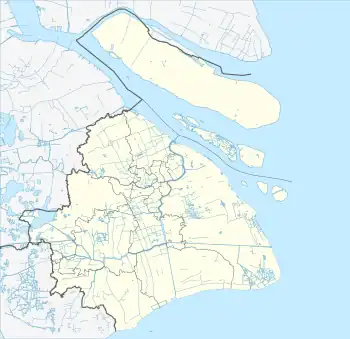| Huangpu River Pu Jiang (浦江) Chunshen Jiang (春申江) Shen Jiang (申江) | |
|---|---|
 A view of the Huangpu River as it flows through downtown Shanghai. | |
 Location of mouth in Shanghai | |
| Native name | 黄浦江 (Chinese) |
| Location | |
| Country | China |
| Municipality | Shanghai |
| Physical characteristics | |
| Source | Dianshan Lake |
| • location | Qingpu, Shanghai, China |
| Mouth | Yangtze River |
• location | Baoshan, Shanghai, China |
• coordinates | 31°23′33″N 121°30′54″E / 31.39250°N 121.51500°E |
| Length | 113 km (70 mi) |
| Discharge | |
| • average | 180 m3/s (6,400 cu ft/s)[1] |
| Basin features | |
| Tributaries | |
| • left | Suzhou Creek |
| Huangpu River | |||||||||||||
|---|---|---|---|---|---|---|---|---|---|---|---|---|---|
| Simplified Chinese | 黄浦江 | ||||||||||||
| Traditional Chinese | 黃浦江 | ||||||||||||
| Postal | Whangpoo River | ||||||||||||
| |||||||||||||
The Huangpu (ⓘ), formerly romanized as Whangpoo,[2] is a 113 km-long (70 mi) river flowing north through Shanghai. The Bund and Lujiazui are located along the Huangpu River.

The Huangpu is the biggest river in central Shanghai, with the Suzhou Creek being its major tributary. It is on average 400 m (1,312 ft) wide and 9 m (30 ft) deep, and divides the city into two regions: Puxi ("west of Huangpu"), the traditional city center, and Pudong ("east of Huangpu").[3]
Bridges
- Fengpu Bridge
- Lupu Bridge, opened 2003.
- Minpu Bridge
- Minpu Bridge No. 2
- The lower deck of this bridge carries Line 5 across the Huangpu River. This is the first line of the Shanghai Metro to cross the river via a bridge.[4]
- Nanpu Bridge, opened 1991.
- Songpu Bridge, opened 1975 railway, 1976 highway.
- Songpu Bridge No. 2
- Songpu Bridge No. 3
- Xupu Bridge, opened 1997.
- Yangpu Bridge, opened 1993.
The following roadways, highways, and railways also cross the Huangpu River via a bridge:
- G1503 Shanghai Ring Expressway
- G50 Shanghai–Chongqing Expressway
- G60 Shanghai–Kunming Expressway
- Zhufeng Highway
- Huqingping Highway
- Shanghai–Hangzhou railway
Tunnels
A number lines of the Shanghai Metro cross underneath the river, including Line 12, Line 4, Line 2, Line 9, Line 4 (twice), Line 8, Line 13, and Line 11 (from north to south geographically).
There are several roadways which cross the Huangpu river via a tunnel, including:
- Bund Sightseeing Tunnel
- Dalian Road tunnel
- Dapu Road tunnel
- East Fuxing Road tunnel
- East Yan'an Road tunnel
- Jiangpu Road tunnel (planned)
- Jungong Road tunnel
- Longyao Road tunnel
- Lujiabang Road tunnel (planned)
- Luoxiu Road tunnel (planned)
- Nenjiang Road tunnel (planned)
- Outer Ring Road tunnel
- Renmin Road tunnel
- Shangzhong Road tunnel
- South Hongmei Road tunnel
- South Wanping Road tunnel (planned)
- South Xizang Road tunnel
- West Changjiang Road tunnel (under construction)
- Xiangyin Road tunnel
- Xinjian Road tunnel
- Yinxing Road tunnel (planned)
- Zhoujiazui Road tunnel (planned)
Ferries

There are currently several ferry lines operated by Shanghai Ferry. Numerous tour boats also ply the harbour in the Pudong area.
Controversy
In March 2013, some 16,000 pig carcasses were found floating in the Huangpu River in Shanghai.[5] Some of the pigs carried ear tags saying they were from Jiaxing, so that city in Zhejiang may be the source; One news agency indicates that dead pigs are often dumped into rivers in China to avoid the disposal cost. [6] However local farmers deny the dumping allegation.[7]
See also
References
Citations
- ↑ (四)水文 Archived 2011-09-29 at the Wayback Machine (in Chinese)
- ↑ Sladen (1895), p. 278.
- ↑ "The New Huangpu River Both Banks". Archived from the original on 2014-04-13. Retrieved Apr 16, 2014.
- ↑ "Shanghai Metro Line 5 South Extension to Start Test Runs". that's Shanghai. 10 August 2018. Retrieved 15 June 2020.
- ↑ Hook, Leslie (May 14, 2013). "China: High and dry: Water shortages put a brake on economic growth". Financial Times. Retrieved 2013-05-15.
- ↑ Barboza, David (March 17, 2014). "Dead pigs floating in Chinese river". Guardian.
- ↑ Barboza, David (March 14, 2013). "A Tide of Death, but This Time Food Supply Is Safe". New York Times.
General and cited references
- Sladen, Douglas (1895), "Bits of China", The Japs at Home (5th ed.), New York: New Amsterdam Book Co., pp. 276–354
External links
 Media related to Huangpu River at Wikimedia Commons
Media related to Huangpu River at Wikimedia Commons